- Home
- Marge Piercy
The Longings of Women Page 3
The Longings of Women Read online
Page 3
Every so often Mrs. Landsman was around, as this morning. Perhaps it was school vacation? Mr. Landsman seemed to travel a great deal because he directed plays. They both had studies. The walls of his were covered with photos of plays, people in costume. There were two miniature sets in his office, like doll houses for adults. He had won some awards, displayed on a shelf. Mary bet he would rather they had given him money, for the Landsmans always seemed a little short on cash for their lifestyle. She would come across the figures on expenses and the budgets Mrs. L. tried to work out.
Mary had been planning to call into the cleaning agency office, as she liked to do each morning. The secretary took her pet-care messages on the sly. Mary would give her a twenty each month under the table. It meant Mary could use the cleaning service as a phone number. But she didn’t like to call in front of her clients. “Mrs. Burke,” Mrs. Landsman said, “I’ve been expecting a phone call from my husband. I have to go to school soon. You’d recognize his voice over the answering machine, wouldn’t you?”
“I think so,” Mary said dully.
“All you have to do is pick up the phone, and it’s like a regular phone call then. Does your daughter have an answering machine?”
Mrs. Landsman seemed compelled to ask her questions. Mary thought that Mrs. L. was some sort of sociologist; certainly she wrote books, usually about women. Mary didn’t care for that sort of book, so she’d never done more than glance at the one about women in prison.
“She does, but I don’t use it,” Mary said. “When I pick up the phone, what do I say to Mr. Landsman?”
“I’m trying to make plans for going to New York, so he has to call me tonight, no matter how late he gets in.… Do you ever go to New York?”
“Not in years,” Mary said, turning on the vacuum cleaner. A person could have told at once that Mrs. Landsman was used to asking people questions—grilling her, as she experienced it. If Mary ever let herself get sucked into one of those conversations, she could easily give herself away. So she resisted.
“How is your daughter? Does she still feel bad about your cleaning?”
“She’s just fine. I haven’t asked her lately.”
Mary did not like having to work hard at lying; she was raised to tell the truth one hundred percent of the time. Sometimes her family had been unpleasantly outspoken. “Well, Aunt Fran, to tell you the truth, that dress makes you look extremely sallow.” “Well, to tell the truth, little Mary, I don’t think he loves you.” The truth was always sour and harsh, like a powerful emetic. If it didn’t hurt, it couldn’t really be the truth. Her parents had not been in the least religious, but they acted as if they believed in hell, the slippery slope into sin if they deviated from the straight and narrow one step’s width. To this day, when she heard someone say, “To tell you the truth,” she drew into herself and waited for the blow in the face.
“What’s the weather like outside?”
“Nippy.”
“I haven’t had a frost yet. Have you, where you live? Was it Dedham?”
“I haven’t noticed.”
“I haven’t used the kitchen much, and David’s room just needs dusting. If there’s time, do the refrigerator.” The woman sighed. “Nothing gets much use this fall.”
Mrs. Landsman sat in her office writing checks. In this house, the missus kept the books, paid the bills and balanced the checkbook. Mrs. Landsman was the one who worried about how the oil bill and the property taxes would get paid and whether the old car would make it another year. Now they had college tuition for one son. It cost as much nowadays to send one kid through college as she and Jim had paid for two. Besides, Jaime had had an athletic scholarship. She busied herself upstairs until finally she heard Mrs. Landsman leaving.
Then she switched on the end of “Regis and Kathie Lee.” She loved the talk shows. Some of the cleaning women were addicted to the soaps, and when they met, they gossiped about characters as if they were acquaintances. What about Billy? Does he still love Vanessa? She liked a show with some content, some issues, where she felt she was learning something. And it was company. If she did not dare talk with her clients, that did not mean she did not wish for a little conversation.
It was a lonely life, to be honest. Never when she was growing up, when she was having babies, when she was raising her children, did she expect to be alone, ever. She had married right out of college. Two years later, she had borne Cindy. Yet here she was, utterly alone in the world. Even the few people who reached out to her did it in a way she didn’t dare respond to. Mrs. Landsman tried to be friendly, but that was only a pit of danger for Mary. She could not let any of her clients find out she was homeless, for she would be out of a job in nothing flat. Nobody would want her in their houses; nobody would trust her. She heard people talking about the homeless, how they were crazy, they were drug addicts, they didn’t want to work. How unpleasant it was to be panhandled, how they should be kept off the streets. How pitiful and dirty they were. As if there weren’t thousands like her who worked every day without making enough for a deposit and rent.
No wonder she was extraordinarily kind to her clients’ animals. With them she did not have to be on guard. The Millers’ Airedale Zurich and Mrs. Solano’s Siamese Griselda who slept around her head purring were the only beings who ever looked into her eyes and accepted the touch of her hands. She who had lived in her marriage, in a neighborhood of constant socializing with a whole web of friends and family, now had as her only intimates the dogs, the cats, the occasional parrot or ferret she took care of and with whom she shared quarters for a night. That was her new circle of friends.
THREE
Leila
The Monday after Melanie’s funeral, Leila went back to work. She had two classes to meet. She did everything with her left hand, lecturing on automatic pilot, dealing with everybody with half a mind. “I’m sorry I couldn’t get back to you sooner. A close friend of mine died.”
Mourning was a state unsupported by contemporary culture. No one knew what to say, and she ended up feeling she had been unwarrantedly personal, unprofessional, emotional, too female. Yet she could offer little of value to anyone. At odd moments she had the urge to cry, but to do so was simply not an option. It would embarrass everyone around her. A professor doesn’t cry in front of students or colleagues. A woman professional can cry only in the bathroom, and then only long enough so that it doesn’t show; in the staff women’s room, it did not escape comment. “Is something wrong, Leila?” a colleague, Barbara, asked her. “Are things all right with Nicolas?”
That was what they expected to go wrong, all the women around her. She made a brief explanation, scrubbed her face with a paper towel and slathered on makeup. She was beginning to hate herself, this wet gusty creature who could not keep her façade in place.
She taught her classes, met students and sat in on a meeting of her sociology department and voted on two motions without being able to remember, as she picked up her briefcase, what the meeting had been about She could have voted to abolish her own position, for all she could recall. More phone calls to dispose of. An ex-student wanting a recommendation she must rush out. Her agent. Leila had been with Sally for ten years.
“Hi, Sally. Before you ask, the book is flying along. The revisions they asked for are all getting done.”
“Good. When?”
“Last of November.…” That was only ten days after the publisher had requested the changes come in. She had learned to be a little late. It seemed to satisfy everyone more fully. If she did things early, they assumed she hadn’t really put the work in. Even if she was just on time, they were unimpressed. A little late was perfect. It didn’t inconvenience them, and yet they could smell the effort.
“Anyhow, that’s not the primary reason I called. Have you been following the Becky Burgess case?”
“Becky Burgess?” Leila’s mind was a bowl of gruel.
“The young woman with the much-younger lover who killed her husband. Or so we all s
uppose.”
“In Falmouth, near the bridge onto the Cape …” Leila vaguely remembered the TV talking to her at supper. When Nick was home, they ate at eight in the dining room. She and David had always used the kitchen when Nick was away. Now with David at Cal Tech, she ate there with first May Rollins, then Peter Jennings talking to her from a little plastic TV just behind the salt shaker and pepper mill. “She’s been tried in the media and convicted of being a bad woman. They’ll send her up for that, whether or not she killed her husband.”
“There’s a lot of interest in this case. I had a call two days ago from your editor. She wants to know if you’d do a book.”
“On a murder case? That’s hardly my metier.”
“Well, Leila, you wrote about women in prison. What’s the difference? Burgess sounds like an interesting hussy. I’m just running this by you. The money’s good, very good. How does three times your last advance sound?”
“Three times? Do they think it’s that big?” That would solve their money problems for a while, pay for David’s college.
“It’s a hard/soft deal. A quarter on signing. Quarter on completion. Quarter on publication. Quarter when the paperback comes out I didn’t say no, because I figure for this kind of money, you might develop an interest.”
“How soon do they want to know?’
“Yesterday. So let’s say by ten A.M. tomorrow.”
She did think about it walking home. Since daylight savings time had ended, she walked back from Lesley in darkness, but the streets were busy. When she was in a hurry, she drove, because she lived in North Cambridge, about a mile from school. The book on incest survivors was on schedule. She had only to rewrite the introduction. Most of the remaining work, compiling tables, putting the bibliography in order, was up to her assistant For the first time in fifteen years, Leila had nothing in the pipeline. Melanie’s long illness had filled Leila’s time and sapped her energy. She did need a project, she needed one badly and at once. But a sensational trial? What was in that for her? She was only marginally respectable academically, although that did not bother her. She made up for any loss of colleagues’ respect by the money she made on the speaking circuit. She had been walking a thin and wavering line between the academic and the popular all of her professional life. What did she care if the case was a bit racy? She tried to remember Becky Burgess. A bedroom suburb. A woman in her mid-twenties with a younger man. Some insurance scam.
Mrs. Burke had cleaned today and left her a bill and a note. “Dear Mrs. Landsman, I found the attached letter under your bed. I don’t know if you need it, but I did not want to throw it away.”
A note? The handwriting belonged to Nick. It was dated the morning they had made love and he returned to New York. He must have left it on her pillow. When she had returned late and exhausted from Melanie’s family, she had ripped off the covers, dived in and never noticed the note.
Dearest Leila,
It was a real joy to see you, however briefly, but the brevity got in the way of what I wanted to say to you. It was too late by the time you got home to have a real conversation.
I’m not sure you really want to bolt down to New York next Saturday. We’re all absolutely crazed with trying to get the play together, and it might not be entirely comfortable for you.
I’ve been terribly depressed and worried. You know how New York throws me. I misplace my sense of myself. I lose direction. I really need you, but of course your work means you can’t be with me. And you’ve been spending an awful lot of time with Melanie, who, after all, has her daughter and her mother besides you. What did I have? I was blue and drowning. I couldn’t sleep and I forfeited confidence in what I was trying to do. I really just needed somebody, anybody, who’d hold my hand and help me through this brief unhappy mess.
Really, it started with Sheryl just because she simply wouldn’t take direction, and I had to get her under control. Jocasta is a critical role, and she was in danger of botching the whole ensemble with her mannerisms.
It’s of no importance, and of course she knows we’re married and not about to let anything come between us. It’s just one of those things I back into when I feel desperate and alone.
The situation with the play is critical. Why not wait until it opens and give me your insight then?
Don’t let this awkward little situation with Sheryl upset you. I just need someone to lean on while I’m in New York.
Your loving husband, Nicolas
She heard the crash and saw that she had taken up the Imari plate he had given her three years before and smashed it against the table. The table had a visible scratch and the plate was in fragments at her feet. She had a moment of regret for something beautiful broken; then she was astonished at the rage that burst out of her. She was not a woman who threw objects or scenes. What she had seen in her mind was smashing the plate across his head. She viewed her anger with surprise, as if it were a storm that had suddenly blown in off the ocean, knocking a tree down.
She had truly dared believe he was done with running around. He had told her a long and moving fable about having realized he was really in middle age. He had insisted that his wandering was over. “I’ve come home to you at last,” he said, “really home.” It had been touching and for a while their sexual relationship had heated up. It was worse than before, when she had simply accepted his out-of-town affairs as the price of the marriage. She had been overjoyed that he had finally relinquished his long, long adolescence and was settling down with her. She paced through the rooms of their Cambridge house, their gracious house with its comfortable furniture, most of it leather, with its Orientals and paintings by friends and acquaintances, David’s attempts at art photography, photos and mementos of Nick’s past successes.
She was calling Sally. “Glad I caught you. I’ll take that offer. Get me expenses up front. I’ll need a lot of transcription for this one.”
“This will work only if you can start at once. The trial is set for late January.”
“Tomorrow I’ll start reading up on the case and trying to see her.”
“Oh, they think she’ll see you, no problem. She loves to talk.”
She realized that Mrs. Burke had probably read the note, and she felt mortified. It was humiliating to have her cleaning lady cognizant of her husband’s infidelities. Mrs. Burke was a dour hardworking woman, whom Leila felt to be silently judgmental. Someone whose life had been totally by the book and who thought other choices shameful. She lived with her married daughter in a conventional situation. She was not a friendly woman, although Leila could understand how the situation did not lend itself to intimacy. She was the boss, the one whose dirt was being removed.
She was being ridiculous. Many friends and acquaintances knew. Every so often she would hear someone had seen him with another very young woman in L.A. or Washington. His affairs had begun shortly after David was born. Nick had not particularly wanted a baby. She had not gotten pregnant intentionally, but when she had found herself carrying, she wanted the child. She had seen it as her one chance for a baby from Nick.
She was too upset to eat. But she felt some satisfaction in the idea of doing a book on a woman who had murdered her husband. She knew that if Nick were there he would get round her, but he wasn’t. So often he wasn’t. She would digest her own anger, she would manage it as she always had. The fear of losing him had constantly forced her to dispose of her negative reactions toward what he did. Her anger toward him caused her the same sense of shame and secretiveness her mother had trained her to feel toward her sanitary napkins, that must not go into the family garbage, that must not be flushed down the toilet lest they clog the pipes, but carried at once outside to the trash.
Her anger had always felt to her too dangerous to let out, a devouring menace. Thus she tried to distance herself from it. But this time that dark energy was propelling her into a new project, something she desperately needed. Her colleagues would be appalled. Good. She had not shocked them in several years.
She was becoming dull. It was time to stir up some dust. She would not feel so much a victim; so much a fool. She longed to concern herself with the problems of strangers.
Normally she would have called Melanie. She would pick up the phone with the fury still driving her, and Melanie would take her down. Melanie understood the price of reaction. She had lost her own husband and she would keep Leila from driving Nick away. Melanie had soothed her into acceptance during too many crises to count.
I hope the play fails, she thought, and then felt the hot flush of disloyalty. How could she hope for anything like that? They were a marriage, they were a mutual cooperative society, and what hurt or benefited one must do the same for the other. Oh, but she was bitterly angry with him. It would take a while to wear off. She had allowed herself to hope that his long wandering had finally run its course and a new stage in their marriage had begun. As they moved together through middle age, they would turn toward each other, share more of their lives, and their marriage would grow warmer and more satisfying. Her long patience would receive its lasting payoff. All the friends and acquaintances who had pitied her would admire her persistence and wisdom. At long last, her husband would be entirely hers.
Indeed, New York was an aberration. It was the same as when he had given up smoking and walked into a room full of smokers, he had to have a cigarette. The younger the actresses were, the more quickly he grew bored. Bringing Oedipus to New York had caused all his anxieties to flare up. In a situation of high stress, backsliding was not surprising. It was a last fling, brought on by the pressures of an opening in Manhattan.
How could she carry on about his infidelity? It was something she had accepted for two decades. She had known it all from the beginning. Never had Nicolas concealed his nature or his intentions: at twenty-two he had announced to her, I do not believe in fidelity. It’s a leash. I don’t want to be walked on a leash by any woman. I will always come back to you, I will always love you, but I won’t deny my curiosity or my desire. My freedom is as precious as life to me. I won’t cut myself to fit.

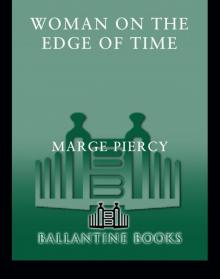 Woman on the Edge of Time
Woman on the Edge of Time The Cost of Lunch, Etc.: Short Stories
The Cost of Lunch, Etc.: Short Stories Made in Detroit: Poems
Made in Detroit: Poems Sleeping With Cats
Sleeping With Cats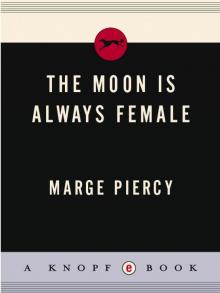 Moon Is Always Female
Moon Is Always Female The Longings of Women
The Longings of Women Circles on the Water
Circles on the Water Summer People
Summer People Gone to Soldiers: A Novel
Gone to Soldiers: A Novel The Hunger Moon: New and Selected Poems, 1980-2010
The Hunger Moon: New and Selected Poems, 1980-2010 Vida
Vida Fly Away Home
Fly Away Home He, She and It
He, She and It So You Want to Write
So You Want to Write Small Changes
Small Changes Braided Lives
Braided Lives Lord Valentine's Castle
Lord Valentine's Castle Dance the Eagle to Sleep
Dance the Eagle to Sleep City of Darkness, City of Light
City of Darkness, City of Light The High Cost of Living: A Novel
The High Cost of Living: A Novel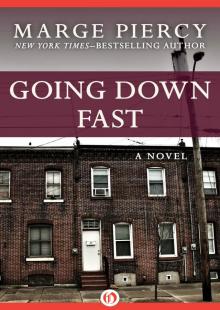 Going Down Fast: A Novel
Going Down Fast: A Novel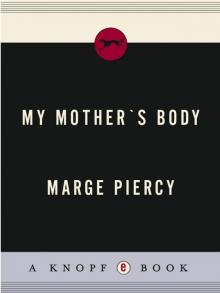 My Mother's Body
My Mother's Body Storm Tide
Storm Tide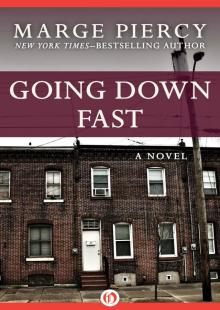 Going Down Fast
Going Down Fast The Third Child
The Third Child The Hunger Moon
The Hunger Moon The Cost of Lunch, Etc.
The Cost of Lunch, Etc. Sex Wars
Sex Wars The High Cost of Living
The High Cost of Living Made in Detroit
Made in Detroit Gone to Soldiers
Gone to Soldiers